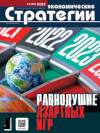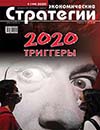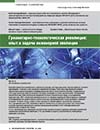Analytical technology of the “economic cross” — a toolkit for modeling the efficiency of closing the nuclear fuel cycle
DOI: 10.33917/es-4.190.2023.92-101
Changes in the economic development priorities during transition to a post-industrial society inevitably forces us to reconsider approaches to the role of innovation in the modern economy, including in nuclear energy. The life cycles of nuclear energy resources and nuclear power units are intersected, and at this intersection energy is generated, revenue occurs, etc. The rest of these life cycles are mainly costs. Method of analyzing this life cycles intersection was named the “economic cross”. The purpose of the study presented in the article is to specify conditions, under which the final revenue, with regard to discounting, will exceed the total costs, and nuclear power technology will be profitable.
References:
1. Kleiner G.B., Rybachuk M.A., Karpinskaya V.A. Strategicheskoe planirovanie i sistemnaya optimizatsiya natsional’noi ekonomiki [Strategic Planning and System Optimization of the National Economy]. Problemy prognozirovaniya, 2022, no 3(192), pp. 6–15.
2. Kleiner G.B. Inklyuzivnyi rost v ekonomike zamknutogo tsikla [Inclusive Growth in a Circular Economy] Ekonomicheskoe vozrozhdenie Rossii, 2022, no 3(73), pp. 37–44.
3. Kleiner G.B., Rybachuk M.A., Karpinskaya V.A. Systemic factors and prerequisites for the inclusive growth of the russian economy. Smart Innovation, Systems and Technologies, 2022, vol. 287, pp. 3–14.
4. Steblyanskaya A.N., Ai M., Efimova O.V., Kleiner G.B., Rybachuk M.A. Multi-capital approach for sustainable growth: experience from the oil & gas companies. Finance: Theory and Practice, 2022, vol. 26, no 4, pp. 29–43.
5. Veretekhina S.V., Kleiner G.B. Kontseptual’nye polozheniya upravleniya sotsial’no-ekonomicheskimi sistemami primenitel’no k podderzhke eksporta otechestvennoi naukoemkoi produktsii v usloviyakh novoi ekonomicheskoi real’nosti [Conceptual Provisions for Managing Socio-Economic Systems in Relation to Supporting the Export of Domestic High-Tech Products in the New Economic Reality]. Russian Economic Bulletin, 2022, vol. 5, no 4, pp. 244–251.
6. Adamov E.O. “Proryv” v yadernoi energetike [“Breakthrough” in Nuclear Power]. Energeticheskaya politika, 2019, no 4, pp. 78–85.
7. Kleiner G.B. Novaya teoriya ekonomicheskikh sistem i ee prilozheniya [New Theory of Economic Systems and Its Applications]. Vestnik RAN, 2011, no 9, pp. 794–808.
8. Timokhin D., Putilov A. Principles of Design of a Learning Management System for Development of Economic Skills for Nuclear Engineering Education. Advances in Intelligent Systems and Computing, 2021, vol. 1310, pp. 40–48.
9. Timokhin D.V., Putilov A.V. Innovatsionnye vozmozhnosti ispol’zovaniya metodologii “ekonomicheskogo kresta” v prognozirovanii perspektiv razvitiya dvukhkomponentnoi atomnoi energetiki [Innovative Possibilities of Applying the “Economic Cross” Methodology in Forecasting the Development Prospects of two-component nuclear energy]. Innovatsii, 2020, no 1, pp. 12–21.
10. Putilov A., Timokhin D., Pimenova V. Adaptation of the educational process to the requirements of the global nuclear market according the concept of “economic cross” through its digitalization. Procedia Computer Science, 2020, no 169, pp. 452–457.





